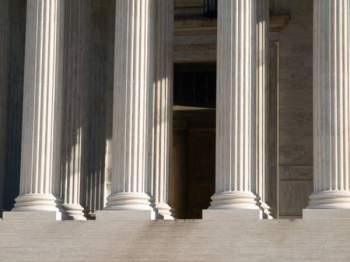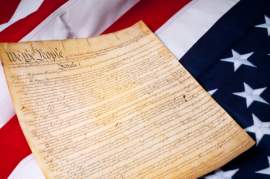
Major Decisions-New Jersey v. T.L.O.

Popular In Constitution
Purpose Of Lifetime Appointment And Pros And Cons Enumerated Powers Bicameral Legislature Background Article 3 Of The Constitution We The People 1st Amendment Who Wrote The Constitution Judicial Review Equal Protection Clause 5th Amendment 10th Amendment Three Fifths Compromise
The Supreme Court has an extensive history in hearing cases in which the Amendments contained in the Bill of Rights are the issue of an alleged violation or infringement situation. However, the majority of the cases deal with adults in real world situations. On certain occasions, the question as to how the Constitution applies to students or those not legally considered adults arises.
A case in the 1960s, known as Tinker v. Des Moines, is an example of students and the application of Constitutional rights. The subject would arise some twenty years later once again in New Jersey v. TLO.
The case of New Jersey v. TLO is in regards to a student being
searched on school grounds because she was thought to be smoking in a
non-smoking area of the campus. Even though TLO--such as the girl was referred
to due to her name not being released because of her age--denied the
accusations of her smoking, she was brought to the principal's office. Once
there, the assistant vice-principal searched TLO's purse, in which she found
marijuana, several forms of paraphernalia, and letters that indicated that she
was involved in dealing marijuana at her school. Subsequently, TLO would be
brought up on charges by the local police and sentenced to one year probation.
The matter was brought to the
New Jersey Supreme Court, in which the probation charges were overturned on the
grounds that the Fourth Amendment of the Constitution had been violated on
TLO's behalf. The State of New Jersey would then appeal to the United States
Supreme Court.
Warren E. Burger was the Chief Justice presiding over New Jersey v.
TLO. After reviewing the case and the application of the Fourth Amendment under
these circumstances, the Supreme Court ruled in favor of New Jersey. The Fourth
Amendment was used to argue that the search conducted by the school official
was unwarranted, and therefore, a violation of TLO's Constitutional rights.
The main issue at hand was that even though the Fourth Amendment is to be applied to all people of the United States, in certain instances there has to be a balance in which its application cannot extend its limits that disrupt certain procedures affecting safety and the overall well-being of a group of people. Such was the case in New Jersey v. TLO, in which it was determined that a school or educational setting warrants some modification regarding the scope in which student's rights are applied.
Though the Supreme Court did not denounce that the Fourth Amendment did not apply to students, a certain consideration to its application in this type of setting required some lax interpretations. The Fourth Amendment states that a search and seizure cannot be lawfully conducted without a warrant or probable cause. However, in a school setting, a search is considered to be reasonable and within the constraints of the Fourth Amendment if there is reasonable suspicion that criminal activity is suspected. However, the Supreme Court also rested its decision that such types of searches are to be conducted by the school themselves and that if law enforcement was to be involved, it could be in breach of a student's Fourth Amendment rights.
NEXT: Major Decisions-New York Times v United States





















